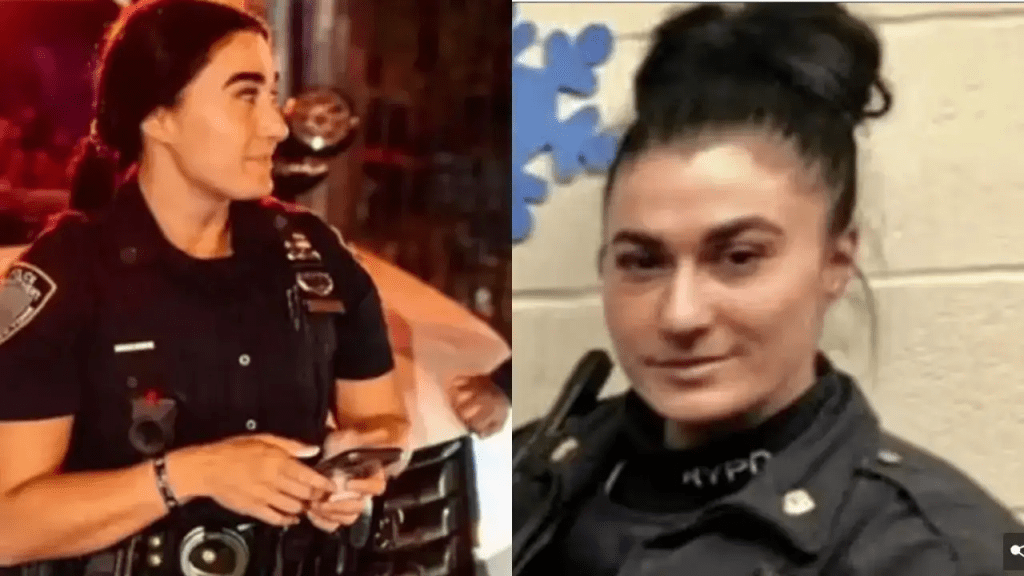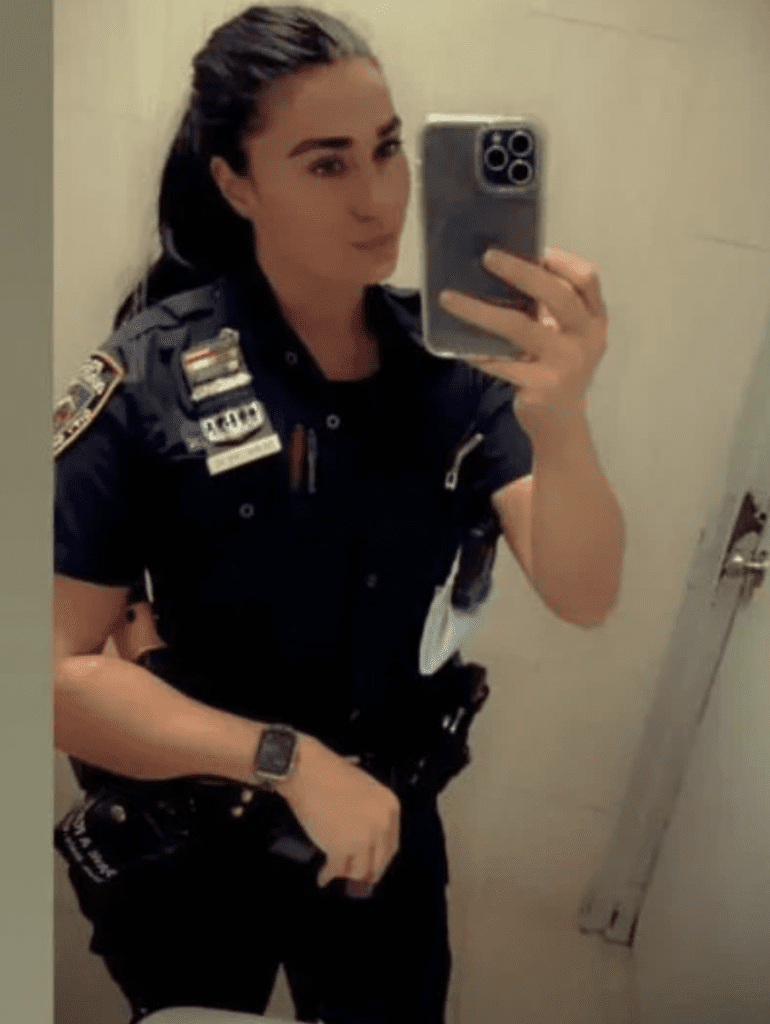It’s not every day that a police officer’s career makes headlines for all the wrong reasons — but that’s exactly what happened when Alisa Bajraktarevic, a 34-year-old former NYPD officer, found herself at the center of an explosive scandal. Her recent dismissal from the force didn’t just make waves — it unraveled a tangled web of controversy involving a leaked topless photo, allegations of sexual harassment, and questions of internal retaliation.
Let’s break down what really happened, why this story matters, and what it reveals about power, privacy, and justice inside the New York Police Department.

Who Is Alisa Bajraktarevic? A Veteran Cop with a Troubled Past
Bajraktarevic wasn’t a rookie. She had spent over a decade with the NYPD, working in the Robbery Squad, and building her identity as a dedicated officer. Colleagues knew her for her sharp instincts, but beneath the surface, tensions were quietly building.
The trouble began to boil over when a photo — one she claims was meant to be private — started circulating among fellow officers. It wasn’t just an embarrassing incident; it was a breach of trust that spiraled into a lawsuit, disciplinary action, and ultimately, her termination.
Video: SHE LOOKS SO DESEPRATE! Female Officer Could LOSE JOB For Helping Dr*g Dealer Boyfriend Avoid JaiI
The Leaked Photo: An Act of Betrayal or Misconduct?
According to Bajraktarevic’s lawsuit, she had shared a topless image with a colleague she was briefly involved with — Lt. Mark Rivera. But instead of keeping it private, Rivera allegedly shared the photo in a group chat with other officers.
Imagine that for a moment — something intimate, meant for one person, becomes digital gossip in one of the world’s largest police forces. That one act sparked a wave of reactions, raising serious questions about digital ethics and internal culture within the NYPD.
Her legal team argues that the image’s distribution wasn’t just unprofessional — it was unlawful. And rather than addressing the internal misconduct, they say the department turned on her.

A Lawsuit, Alleged Harassment, and A Culture of Silence
The topless photo wasn’t the only issue Bajraktarevic raised. In 2022, she filed additional court documents claiming she had been sexually harassed by a superior. That accusation was met with denial, but for her, it was the start of a larger pattern.
Her attorney, John Scola, believes the department’s decision to terminate her had less to do with her conduct and more to do with the complaints she raised. “There is no doubt,” Scola said, “that our client’s internal complaints of sexual harassment and the unlawful dissemination of a naked photograph were the true motivating factors behind her termination.”
This narrative suggests a department more concerned with silencing dissent than correcting internal wrongdoing. Is this the price of speaking up in a male-dominated institution?
Video: Female Cop Under Investigation For Doing This! 😱
The Drug Arrest Incident: Crossing the Line or Being Targeted?
The NYPD’s case wasn’t built solely on the photo. Back in 2023, during a narcotics investigation, Bajraktarevic’s then-boyfriend, Kelvin Hernandez, was stopped by officers. She tried to step in, insisting he wasn’t involved in selling drugs.
That might sound like loyalty — but to the NYPD, it looked like interference. A source revealed that narcotics officers didn’t even know who she was until she made herself known on the scene.
Hernandez was charged with resisting arrest, and the moment added fuel to the fire. For NYPD leadership, this was one controversy too many. But for Bajraktarevic, it was yet another example of being punished for her associations and personal choices.
Instagram, Public Image, and a “Thick Police Officer” Post
In the age of social media, everything you post matters. Bajraktarevic’s Instagram and Reddit accounts drew significant attention, especially after her firing. From bikini-clad vacation photos to captions like “Thick police officer,” the posts were used by critics to paint her as unprofessional — even though nothing she shared violated any official policy.
But was it fair? Should an off-duty officer’s personal posts dictate her professional worth?
Her supporters say the backlash proves an uncomfortable truth: that women in uniform face harsher scrutiny for expressing confidence and femininity online.

Is This Retaliation or Just Consequences?
The department’s official stance is simple — she broke protocol and crossed the line. But her camp sees a darker motive: retaliation. After all, why was she fired now, years after the original suspension over the photo? Why now, after filing harassment claims?
To Bajraktarevic, this isn’t just a firing — it’s a takedown. A signal to other female officers about what happens when you speak up or refuse to play by the old rules.
What This Scandal Tells Us About Power and Privacy
At its core, this story isn’t just about one officer. It’s about the culture within a powerful institution — and what happens when someone challenges that culture.
Alisa Bajraktarevic’s fall from grace is messy, controversial, and still unfolding. Whether her dismissal was deserved or a cover-up for something bigger will likely be decided in court. But one thing is clear: this case has exposed the tension between loyalty and justice, between personal rights and professional expectations.
Conclusion: A Story That’s Bigger Than One Officer
The scandal surrounding Alisa Bajraktarevic is more than tabloid fodder — it’s a mirror reflecting deep cracks within the NYPD. From photo privacy violations to harassment allegations and disputed disciplinary actions, this is a cautionary tale about the cost of being outspoken in a rigid hierarchy.
Whether you see her as a wronged whistleblower or an officer who overstepped boundaries, one thing’s certain: this isn’t the last we’ll hear of Alisa Bajraktarevic. Her case is pushing the NYPD into uncomfortable territory, and the ripple effects could spark serious conversations about accountability, digital ethics, and the treatment of women in uniform.